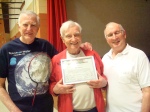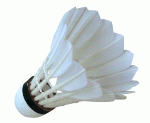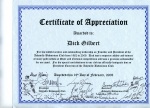Dick Gilbert named President Emeritus
March 24, 2009 at 7:23 pm | Posted in Club Business | 1 Comment

In appreciation for his faithful service and outstanding leadership as Founder and President of Asheville Badminton Club from 1982 to 2009. Dick was a superior athlete and winner of many gold medals at State and National competitions and was a gracious ambassador for our sport. For his special contributions to our club we officially designate him as President Emeritus of the Asheville Badminton Club.
Pictured: Norm Wilhelmi, Dick Gilbert and Leigh Svenson

San Francisco Loses at Badminton
March 12, 2009 at 3:42 pm | Posted in General | 2 Comments Outmatched by an 86-Year-Old
Outmatched by an 86-Year-Old
Shuttlecock Flap Was Over Court Fees; Ed Leong Outwits the Parks Department
By PUI-WING TAM
View entire Wall Street Journal Article for video and slide show.
SAN FRANCISCO — In a time when governments across the country are raising every manner of fee to battle nasty budget deficits, one 86-year-old man here drew the line.
Ed Leong decided to fight City Hall over badminton. And, soon, City Hall found it too hard to fight Ed Leong.
Since January, Mr. Leong has campaigned against new court fees he called “disturbing and unfair” because they particularly affected ethnic Asians, especially Chinese-American players. The retiree collected 200 signatures opposing the charge, presented a petition to Mayor Gavin Newsom’s office, staged a rally in front of City Hall and persistently called local politicians to complain.
Ed Leong protested San Francisco’s badminton-court fees and played elsewhere until the city modified the rule. Now he plans to return to the city’s courts.
“I’ve been playing badminton for 25 years at city facilities, and we were so troubled by the fee,” says Mr. Leong, who plays the game once or twice a week as his primary form of exercise. “I’d suggest to the city that they think twice before taking on us badminton players again.”
Governments have found tough going when they mess with people’s hobbies. Iowa recently dropped a proposed 34% increase in its hunting and fishing license fees after public grumbling. Following some complaints, Idaho in February did likewise, scaling back proposed fee increases for hunting and fishing.
The San Francisco shuttlecock flap began in January. For years, playing at the city’s recreation centers had been free. But officials — seeking to close an $11.4 million Parks Department budget deficit — began charging players $4 to rent a court for 45 minutes.
But here’s the rub: The city didn’t impose a similar fee for basketball and volleyball, which are played on the same gym floors as badminton is.
That sparked an outcry as word of the new fee spread through the city’s Asian communities. Far from the U.S. picnic pastime of desultory whacks of a plastic birdie with spindly rackets, badminton is practically a national obsession in China and Thailand, where many Asian immigrants here were born. About 90% of Bay Area badminton players are Asian, according to local badminton associations. Asian-Americans say they were being unfairly singled out.
Badminton Players Protest Court Fees
2:46
Who says you can’t fight City Hall? Badminton players in San Francisco protested a city-mandated fee for playing badminton — and won. WSJ’s Pui-Wang Tam reports.
Mr. Leong, a Chinese-American who started playing badminton in the 1940s, was particularly upset. The former city housing inspector says the sport keeps him lean and will help him live past his 87th birthday.
One day in February, Alice Kong, a 42-year-old real-estate agent, was playing badminton with her friends as part of her exercise regimen. But while she had been playing the game two to three times a week at city facilities, she has been driving 15 miles outside San Francisco to the nearby town of Burlingame, to a private badminton club.
As she limbered up for a match there, Ms. Kong said she didn’t intend to play badminton again in San Francisco’s recreation centers, especially since the private club charges just $5 to play all day. “Why are they picking on Chinese people with the fees?” she said. “Usually we’re not outspoken, but this just isn’t fair.”
On another court at the same club, Mr. Leong slapped a backhand as he warmed up with three friends for a doubles match.
Unhappy that only badminton players were being targeted by the San Francisco fees, Mr. Leong and several other players quickly circulated their petition. In mid-January, he and a dozen other badminton enthusiasts camped outside City Hall for several hours to chant their objections to the fee before presenting the petition to the mayor’s office. “I understand the city is short of funds, but just to have the badminton group foot the bill is unfair,” says Mr. Leong.
The protests made news in local Chinese papers and on Chinese-language TV stations. Carmen Chu, a politician who represents San Francisco’s Sunset neighborhood, which is heavily Chinese-American, was soon deluged with emails and calls from constituents over the fee.
Says Ms. Chu: “People are concerned about it and frustrated this fee was put on a single sport.” Mr. Leong, in particular, kept calling and emailing, she adds. In January, Ms. Chu invited the Parks Department to appear at a city budget hearing to explain why it levied a fee on badminton alone.
Jared Blumenfeld, the Parks Department’s general manager, attended a community meeting in the Sunset neighborhood in early February, partly to answer questions from residents about the badminton fees. “I treat it seriously,” he says. He acknowledged badminton shouldn’t have been picked on first. He blames the situation on a lack of “capacity” in his department to roll out more than one new fee at a time. “I didn’t really know people were so excited about badminton,” he says.
The badminton fee did have one other purpose, he says: to curb abuse of badminton bookings.
He says half a dozen badminton players — he won’t say who — were using the Parks Department’s online system to reserve 130 hours of playing time each month — often double-booking at the same times at different locations. Then they wouldn’t show up. The fee was designed in part “to create incentive for people to really use the courts,” says Mr. Blumenfeld.
Still, Mr. Blumenfeld says his department “poorly handled” the badminton fee. As a result, many of the city’s recreation centers lost badminton players. Since the new fee took effect, the number of city badminton courts that people registered to reserve for the January through March period fell 50% from the October through December period, according to a Parks Department spokeswoman.
Mr. Leong repaired to Burlingame. But determined to keep pressing the fee issue, he called the Parks Department’s Mr. Blumenfeld Friday to lobby him directly. During their three-minute conversation, the Parks general manager said he would look into the matter, says Mr. Leong.
Later in the day, Mr. Blumenfeld changed the plan. Citing the strong community reaction, the Parks Department declared it would drop the badminton charge in March and come back in April with a lower fee — $1 for 45 minutes — for badminton, volleyball and basketball alike.
“I guess we’re finally getting somewhere,” says Mr. Leong, who adds that he now plans to return to playing badminton at the city’s recreation centers. “What benefit is there to have empty gyms? It’s good they admitted their mistake,” he says.
Blog at WordPress.com.
Entries and comments feeds.
